MiltonFriedman实证经济学的方法论
- 格式:doc
- 大小:127.50 KB
- 文档页数:22
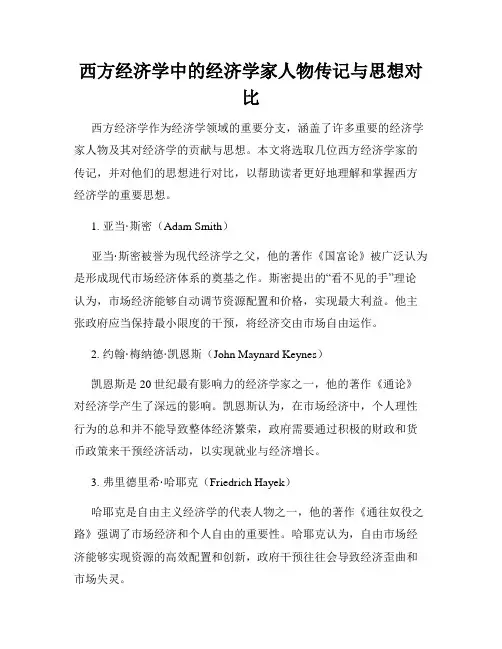
西方经济学中的经济学家人物传记与思想对比西方经济学作为经济学领域的重要分支,涵盖了许多重要的经济学家人物及其对经济学的贡献与思想。
本文将选取几位西方经济学家的传记,并对他们的思想进行对比,以帮助读者更好地理解和掌握西方经济学的重要思想。
1. 亚当·斯密(Adam Smith)亚当·斯密被誉为现代经济学之父,他的著作《国富论》被广泛认为是形成现代市场经济体系的奠基之作。
斯密提出的“看不见的手”理论认为,市场经济能够自动调节资源配置和价格,实现最大利益。
他主张政府应当保持最小限度的干预,将经济交由市场自由运作。
2. 约翰·梅纳德·凯恩斯(John Maynard Keynes)凯恩斯是20世纪最有影响力的经济学家之一,他的著作《通论》对经济学产生了深远的影响。
凯恩斯认为,在市场经济中,个人理性行为的总和并不能导致整体经济繁荣,政府需要通过积极的财政和货币政策来干预经济活动,以实现就业与经济增长。
3. 弗里德里希·哈耶克(Friedrich Hayek)哈耶克是自由主义经济学的代表人物之一,他的著作《通往奴役之路》强调了市场经济和个人自由的重要性。
哈耶克认为,自由市场经济能够实现资源的高效配置和创新,政府干预往往会导致经济歪曲和市场失灵。
4. 米尔顿·弗里德曼(Milton Friedman)弗里德曼是自由市场经济学派的重要代表人物,他的思想对后来的经济学有着广泛的影响。
弗里德曼主张市场自由,反对政府干预经济。
他提出的货币数量论认为,通货膨胀是由货币供应量过度增加引起的,应该通过稳定的货币政策来控制。
5. 费雪(Irving Fisher)费雪是20世纪初期最著名的经济学家之一,他的贡献主要集中在货币理论和数量理论领域。
费雪提出了货币数量论,指出货币供应量和物价水平之间存在着紧密的关系。
他还发展了“交易方程”理论,用于解释货币流通和经济活动之间的关系。
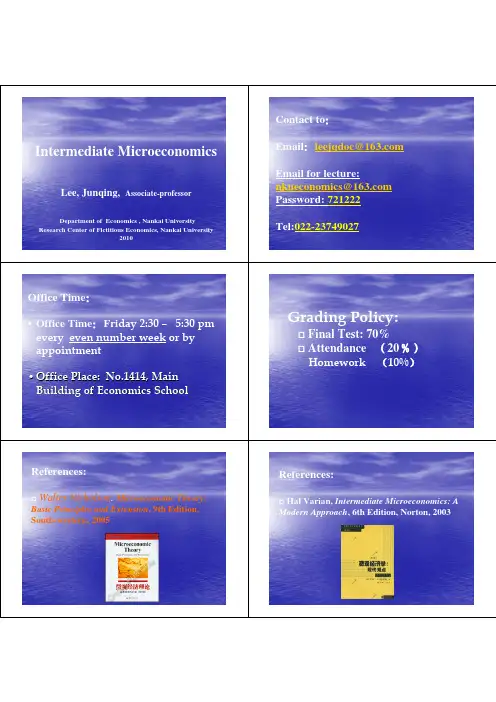
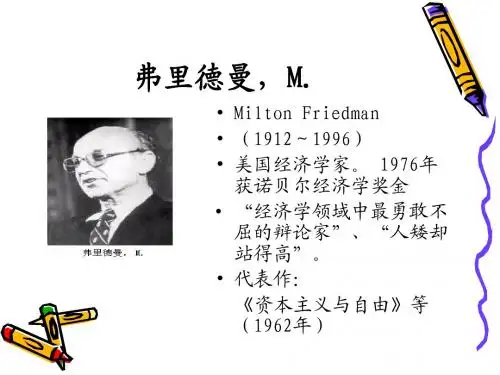
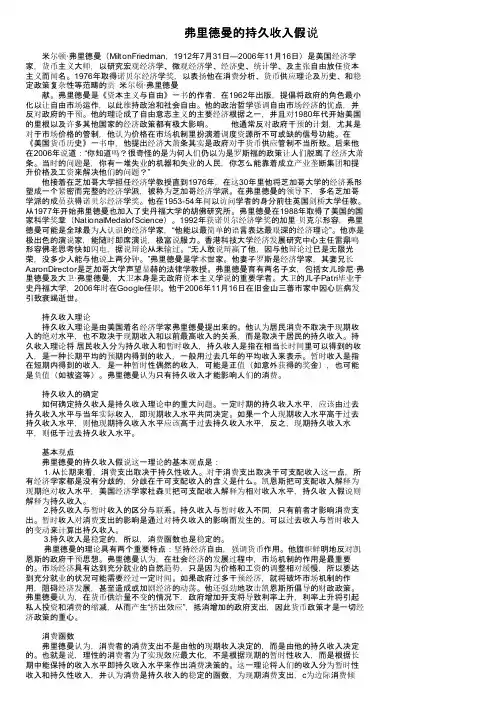
弗里德曼的持久收入假说 米尔顿·弗里德曼(MiltonFriedman,1912年7月31日—2006年11月16日)是美国经济学家,货币主义大师,以研究宏观经济学、微观经济学、经济史、统计学、及主张自由放任资本主义而闻名。
1976年取得诺贝尔经济学奖,以表扬他在消费分析、货币供应理论及历史、和稳定政策复杂性等范畴的贡米尔顿·弗里德曼 献。
弗里德曼是《资本主义与自由》一书的作者,在1962年出版,提倡将政府的角色最小化以让自由市场运作,以此维持政治和社会自由。
他的政治哲学强调自由市场经济的优点,并反对政府的干预。
他的理论成了自由意志主义的主要经济根据之一,并且对1980年代开始美国的里根以及许多其他国家的经济政策都有极大影响。
他通常反对政府干预的计划,尤其是对于市场价格的管制,他认为价格在市场机制里扮演着调度资源所不可或缺的信号功能。
在《美国货币历史》一书中,他提出经济大萧条其实是政府对于货币供应管制不当所致。
后来他在2006年说道:“你知道吗?很奇怪的是为何人们仍以为是罗斯福的政策让人们脱离了经济大萧条。
当时的问题是,你有一堆失业的机器和失业的人民,你怎么能靠着成立产业垄断集团和提升价格及工资来解决他们的问题?” 他接着在芝加哥大学担任经济学教授直到1976年,在这30年里他将芝加哥大学的经济系形塑成一个紧密而完整的经济学派,被称为芝加哥经济学派。
在弗里德曼的领导下,多名芝加哥学派的成员获得诺贝尔经济学奖。
他在1953-54年间以访问学者的身分前往英国剑桥大学任教。
从1977年开始弗里德曼也加入了史丹福大学的胡佛研究所。
弗里德曼在1988年取得了美国的国家科学奖章(NationalMedalofScience)。
1992年获诺贝尔经济学奖的加里·贝克尔形容,弗里德曼可能是全球最为人认识的经济学家,“他能以最简单的语言表达最艰深的经济理论”。
他亦是极出色的演说家,能随时即席演说,极富说服力。
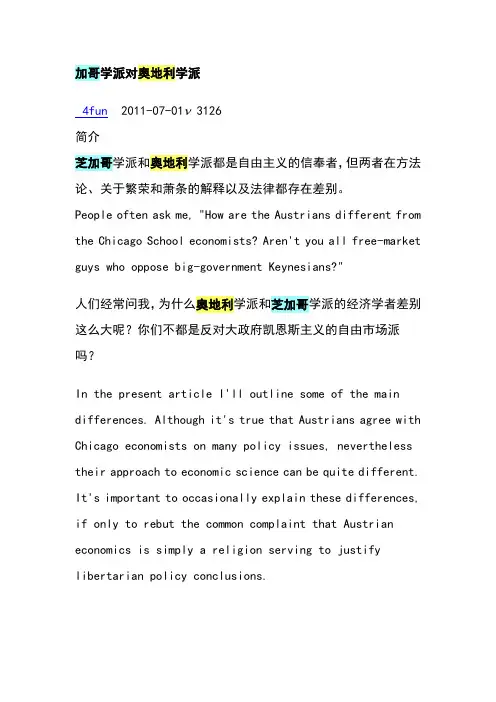
加哥学派对奥地利学派4fun 2011-07-01ν 3126简介芝加哥学派和奥地利学派都是自由主义的信奉者,但两者在方法论、关于繁荣和萧条的解释以及法律都存在差别。
People often ask me, "How are the Austrians different from the Chicago School economists? Aren't you all free-market guys who oppose big-government Keynesians?"人们经常问我,为什么奥地利学派和芝加哥学派的经济学者差别这么大呢?你们不都是反对大政府凯恩斯主义的自由市场派吗?In the present article I'll outline some of the main differences. Although it's true that Austrians agree with Chicago economists on many policy issues, nevertheless their approach to economic science can be quite different. It's important to occasionally explain these differences, if only to rebut the common complaint that Austrian economics is simply a religion serving to justify libertarian policy conclusions.在本文中,我将列举出一些两者的不同之处,虽然事实上奥地利学派也同意芝加哥学派学者提出的许多政治主张,但是两者的经济学分析方法是很不一样的。
我们有必要常常去澄清这种区别,否则就难以还击那些认为“奥地利经济学派只是为了证明自由主义政策主张正确的教条主义”的观点。
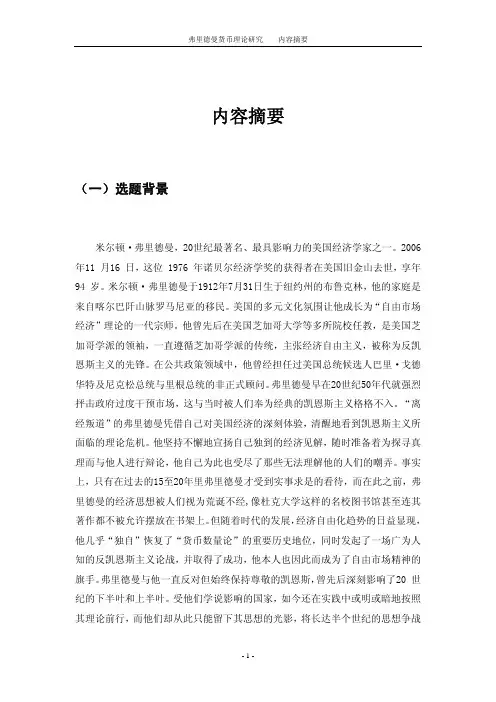
内容摘要(一)选题背景米尔顿·弗里德曼,20世纪最著名、最具影响力的美国经济学家之一。
2006年11 月16 日,这位 1976 年诺贝尔经济学奖的获得者在美国旧金山去世,享年94 岁。
米尔顿·弗里德曼于1912年7月31日生于纽约州的布鲁克林,他的家庭是来自喀尔巴阡山脉罗马尼亚的移民。
美国的多元文化氛围让他成长为“自由市场经济”理论的一代宗师。
他曾先后在美国芝加哥大学等多所院校任教,是美国芝加哥学派的领袖,一直遵循芝加哥学派的传统,主张经济自由主义,被称为反凯恩斯主义的先锋。
在公共政策领域中,他曾经担任过美国总统候选人巴里·戈德华特及尼克松总统与里根总统的非正式顾问。
弗里德曼早在20世纪50年代就强烈抨击政府过度干预市场,这与当时被人们奉为经典的凯恩斯主义格格不入。
“离经叛道”的弗里德曼凭借自己对美国经济的深刻体验,清醒地看到凯恩斯主义所面临的理论危机。
他坚持不懈地宣扬自己独到的经济见解,随时准备着为探寻真理而与他人进行辩论,他自己为此也受尽了那些无法理解他的人们的嘲弄。
事实上,只有在过去的15至20年里弗里德曼才受到实事求是的看待,而在此之前,弗里德曼的经济思想被人们视为荒诞不经,像杜克大学这样的名校图书馆甚至连其著作都不被允许摆放在书架上。
但随着时代的发展,经济自由化趋势的日益显现,他几乎“独自”恢复了“货币数量论”的重要历史地位,同时发起了一场广为人知的反凯恩斯主义论战,并取得了成功,他本人也因此而成为了自由市场精神的旗手。
弗里德曼与他一直反对但始终保持尊敬的凯恩斯,曾先后深刻影响了20 世纪的下半叶和上半叶。
受他们学说影响的国家,如今还在实践中或明或暗地按照其理论前行,而他们却从此只能留下其思想的光影,将长达半个世纪的思想争战留给了这个争论不休的世界。
米尔顿·弗里德曼的货币理论的影响是如此之大,以至于它几乎成为了现代货币政策理论和操作的代名词。
他在货币理论与政策的各个领域都取得了杰出的成就。
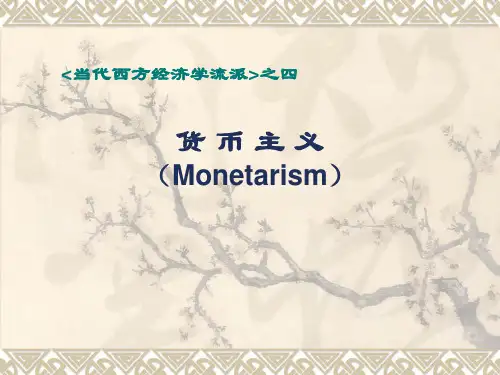
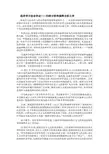
经济学方法论争论——归纳分析和演绎分析之争经济学方法论作为经济理论的重要组成部分之一,应该说其对经济学的发展和变革是有着十分重要的推动作用的。
有关经济学方法论流变与纷争的传统由来已久,但在斯密之前经济学界还没有明显的方法论之争,当时的主流观点还是基于对历史和现实的归纳分析。
斯密以后,他著作中所隐含的归纳分析和演绎分析为不同类型的学者所继承和发扬。
马尔萨斯继承了斯密的归纳分析法,而李嘉图则发展了斯密的演绎分析方法。
李嘉图充分发展了他的抽象能力,用严格的逻辑把经济整体简化为几个变量,并在不言自明的假设上用逻辑的方法推理而得出一般性的结论,从而论述了总的规律。
由于麦克库罗奇(1825)、詹姆斯·穆勒(1821)等重要人物对李嘉图的追随和极力宣传,导致其学说和研究方法在当时影响甚大,甚至形成了一个影响深远的李嘉图学派。
自演绎分析诞生和壮大之时,就不时有一些经济学家对经济学界演绎偏盛的倾向提出批判和反思,古典时期的一个重要代表就是西斯蒙第(1819)。
西斯蒙第反对经济学中像李嘉图、萨伊和麦克库洛赫那样使用抽象法和演绎法,强调不应建立在一系列的数理式定理上,而是必须以研究人和人类为主,了解人性,鉴别不同时期、不同地区的社会生活条件。
19世纪70年代以后出现的奥地利学派则是演绎主义方法论的典型代表,以门格尔为代表的奥地利学派,还就经济学应当采取演绎分析法还是归纳分析法,与以施穆勒为代表的德国历史学派展开了一场论战。
这场争论使得“方法论之争”成为经济学辞书中的一个固定词条,因而在经济学说史上具有空前的影响。
尽管在这场著名的经济学方法论争论中并没有得出明确的胜负,但是,随着这次争辩中的书信被冠以《德国国民经济学的历史主义的错误》为名出版,抽象分析以及建立纯理论的观点得到的广泛宣扬。
随着功利主义和边际效用的兴起,经济学就急速转入抽象演绎化的研究轨道。
自马歇尔建立了新古典经济学之后,其追随者夸大了经济学的抽象化能力,并逐渐形成了目前西方经济学界彻底漠视古典政治经济学研究对象和方法的主流氛围,抽象演绎分析也成为新古典经济学根本性分析思路。
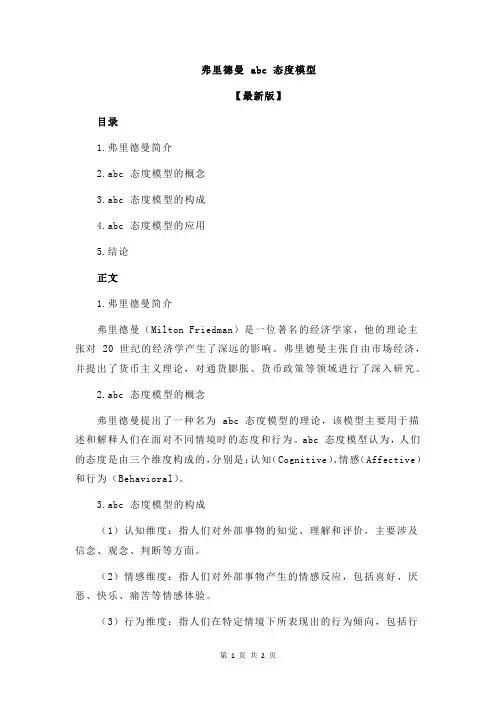
弗里德曼 abc 态度模型【最新版】目录1.弗里德曼简介2.abc 态度模型的概念3.abc 态度模型的构成4.abc 态度模型的应用5.结论正文1.弗里德曼简介弗里德曼(Milton Friedman)是一位著名的经济学家,他的理论主张对 20 世纪的经济学产生了深远的影响。
弗里德曼主张自由市场经济,并提出了货币主义理论,对通货膨胀、货币政策等领域进行了深入研究。
2.abc 态度模型的概念弗里德曼提出了一种名为 abc 态度模型的理论,该模型主要用于描述和解释人们在面对不同情境时的态度和行为。
abc 态度模型认为,人们的态度是由三个维度构成的,分别是:认知(Cognitive)、情感(Affective)和行为(Behavioral)。
3.abc 态度模型的构成(1)认知维度:指人们对外部事物的知觉、理解和评价,主要涉及信念、观念、判断等方面。
(2)情感维度:指人们对外部事物产生的情感反应,包括喜好、厌恶、快乐、痛苦等情感体验。
(3)行为维度:指人们在特定情境下所表现出的行为倾向,包括行为意图、行为准备和实际行为等。
4.abc 态度模型的应用abc 态度模型广泛应用于社会心理学、市场营销、教育、政治等领域。
通过分析人们的认知、情感和行为,可以预测和解释他们在特定情境下的行为选择。
此外,该模型还有助于设计和实施有效的说服策略,以改变人们的态度和行为。
5.结论弗里德曼的 abc 态度模型是一种具有广泛应用价值的理论,它为我们理解人类行为提供了一个有用的框架。
通过对人们的认知、情感和行为进行分析,我们可以更好地预测和解释他们在不同情境下的态度和行为选择。
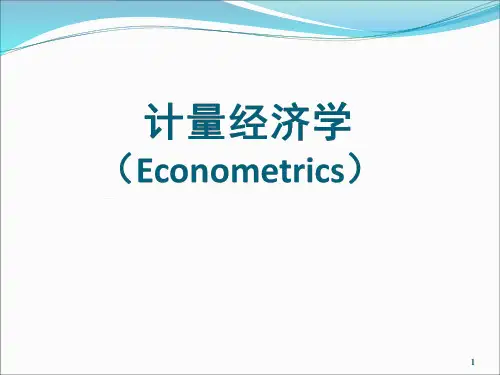
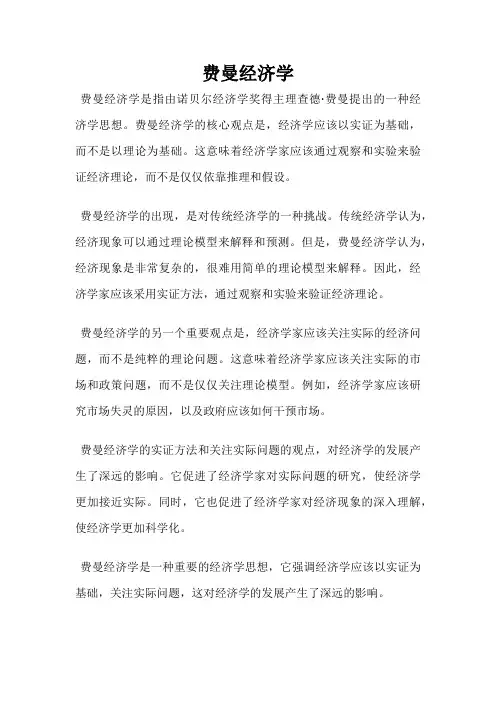
费曼经济学
费曼经济学是指由诺贝尔经济学奖得主理查德·费曼提出的一种经济学思想。
费曼经济学的核心观点是,经济学应该以实证为基础,而不是以理论为基础。
这意味着经济学家应该通过观察和实验来验证经济理论,而不是仅仅依靠推理和假设。
费曼经济学的出现,是对传统经济学的一种挑战。
传统经济学认为,经济现象可以通过理论模型来解释和预测。
但是,费曼经济学认为,经济现象是非常复杂的,很难用简单的理论模型来解释。
因此,经济学家应该采用实证方法,通过观察和实验来验证经济理论。
费曼经济学的另一个重要观点是,经济学家应该关注实际的经济问题,而不是纯粹的理论问题。
这意味着经济学家应该关注实际的市场和政策问题,而不是仅仅关注理论模型。
例如,经济学家应该研究市场失灵的原因,以及政府应该如何干预市场。
费曼经济学的实证方法和关注实际问题的观点,对经济学的发展产生了深远的影响。
它促进了经济学家对实际问题的研究,使经济学更加接近实际。
同时,它也促进了经济学家对经济现象的深入理解,使经济学更加科学化。
费曼经济学是一种重要的经济学思想,它强调经济学应该以实证为基础,关注实际问题,这对经济学的发展产生了深远的影响。
评价芝加哥学派的经济观点1.引言1.1 概述概述部分的内容应该对芝加哥学派的经济观点进行简要介绍和概述。
以下是概述部分的内容示例:概述:芝加哥学派是20世纪美国经济学界最具影响力的学派之一,以其自由市场和个人主义的观点而闻名。
该学派的理论和研究方法对经济学的发展产生了深远的影响,并对许多国家的经济政策产生了重要的指导作用。
芝加哥学派的起源可追溯到20世纪30年代,当时美国正经历大萧条,经济学界面临着巨大的挑战。
芝加哥大学的一批经济学家,如弗里德曼、斯蒂格勒和米尔斯,开始对现有经济思想提出质疑,并试图寻找新的经济理论来解释和应对这一危机。
他们倡导自由市场的经济体制和限制政府干预的理念,认为市场能够有效配置资源、实现最优效益,并为个人提供更多的自由选择。
芝加哥学派的核心观点主要包括市场机制的有效性、个体理性行为和价格机制的重要性。
他们认为,自由市场能够促进有效资源配置和经济增长,市场价格能够传递有效信息,个体的理性行为能够推动经济的发展。
他们提出了一系列经济学模型和理论,如供给与需求理论、资本理论和货币数量理论等,以支持他们的观点并对政策作出建议。
对芝加哥学派的评价是复杂而多样的。
一方面,芝加哥学派的观点为经济学的发展带来了独特的贡献,推动了经济学的现代化和数理化。
他们的理论和研究方法为经济学提供了新的视角,为决策者提供了有益的政策建议。
另一方面,芝加哥学派的观点也受到了批评。
一些人认为他们过于偏向自由市场,忽视了政府在经济中的重要作用,而且在解释某些经济现象时可能存在局限性。
无论如何,芝加哥学派对经济学的影响是不可忽视的。
他们的观点和研究方法塑造了现代经济学的研究领域和方法论,并对政策制定者和经济学家的思考方式产生了深远影响。
评价芝加哥学派的经济观点需要从不同的角度进行综合考量,并对其贡献和局限性进行客观评估。
在本文中,将对芝加哥学派的起源、核心观点及其对经济学的影响进行深入探讨和评价。
文章结构部分的内容可以包括对整篇文章的组织架构的介绍和各个章节的主要内容的概括。
实证经济学方法论实证经济学是根据经济实践中的实证事实对经济形势及其发展趋势进行研究和探讨的学科。
它既关注经济活动的实质性和理论性,也重视经济活动的实证性。
实证经济学方法论将实证经济学研究的方法和原则进行系统的研究和探讨,讨论实证经济学的方法是如何定量分析和总结经济过程,以及如何用它们来研究经济问题。
实证经济学方法论以科学可信的实证事实为基础,讨论和研究实证经济学研究方法的理论和步骤以及这些方法的特性。
它讨论如何定量分析经济过程,研究经济问题,应用实证研究方法来探讨经济现象,以及如何从实证经济分析中获得有价值的结论。
实证经济学方法论的研究方法有:实证分析法、调研法、数据模型建构法等。
实证分析法是收集有关经济数据,运用相关数学模型和算法,对数据进行统计处理,以分析出其特征、规律性和发展趋势。
调研法主要是采用文献研究和实地考察的方法,分析具体的经济问题,主要用于定性经济分析。
数据模型建构法是以实证数据为基础,构建实证经济学数据模型,借助计算机结合实证数据和实证理论对经济过程进行多角度的描述和分析。
在实证经济学方法论中,经济原理、经济数据分析和经济模型建构是实证经济学研究的基本步骤。
经济原理是指实证经济学中的基本原理,如供求面前的曲线、需求曲线的长期趋势。
经济数据分析是对经济数据进行统计处理以及应用相关数学公式和模型来分析经济过程中出现的现象,以及影响这些现象的因素等。
经济模型建构是将经济原理和数据进行结合,利用实证数据和实证理论来构建更准确的经济模型,建立经济分析的可操作性数学模型。
实证经济学方法论是实证经济学研究的重要分支,应用其方法可以更深刻地认识和洞察经济现象,并由此发现更有效的、科学的解决方案。
实证经济学方法论今后在实证经济研究中将发挥重要作用,特别是在实证分析法、调研法、数据模型建构法等方面发挥着至关重要的作用。
经济学家及流派引言经济学家是研究经济现象和经济活动的专家,他们通过理论模型和实证研究来分析、预测和解释经济现象。
经济学家的思想和观点形成了不同的流派,每个流派都有其独特的理论基础和方法论。
本文将介绍一些著名的经济学家及其代表性流派,包括古典经济学、凯恩斯主义、新古典主义、奥地利学派和行为经济学。
我们将探讨这些流派的核心理论观点以及在经济学发展中所起到的作用。
古典经济学古典经济学是现代经济学的基础,被认为是第一个系统阐述市场机制原理的流派。
亚当·斯密(Adam Smith)被视为古典经济学的奠基人,他在《国富论》中提出了自由放任市场机制可以实现资源有效配置和社会福利最大化的观点。
古典经济学强调市场自由竞争、劳动分工以及个人追求利益最大化的重要性。
凯恩斯主义凯恩斯主义是20世纪30年代由约翰·梅纳德·凯恩斯(John Maynard Keynes)提出的一种经济学理论。
凯恩斯认为,市场机制并不能自动实现充分就业和稳定经济增长,政府应该通过财政和货币政策来干预经济,以实现宏观经济稳定。
凯恩斯主义强调需求管理和公共支出对于刺激经济增长的重要性。
新古典主义新古典主义是20世纪中叶以来发展起来的一种经济学思潮。
新古典主义将个体行为视为理性决策,并通过供求关系来解释市场均衡。
新古典主义强调市场机制的效率和资源配置的最优化。
米尔顿·弗里德曼(Milton Friedman)是新古典主义思想的代表人物之一,他提出了货币供给决定宏观经济变动的观点,并主张自由市场与个人自由。
奥地利学派奥地利学派是19世纪末20世纪初在奥地利经济学家弗里德里希·哈耶克(Friedrich Hayek)的领导下兴起的一种经济学流派。
奥地利学派强调市场竞争和私有财产权的重要性,认为市场机制能够有效地协调资源分配和实现经济增长。
哈耶克还提出了信息不对称和知识分散的观点,对市场失灵进行了深入研究。
弗里德曼的货币需求函数及含义1.引言货币需求函数是宏观经济学中一个重要的概念,描述了人们持有货币的意愿和行为。
本文将介绍由美国经济学家米尔顿·弗里德曼提出的货币需求函数及其含义。
弗里德曼是20世纪最重要的经济学家之一,他对货币供应和通货膨胀的理论与政策有着深远的影响。
2.弗里德曼的货币需求函数弗里德曼提出的货币需求函数可以表示为:M=P*L(Y,R)其中,M代表货币需求量;P代表物价水平;L代表实际收入(Y)和利率(R)对货币需求的影响。
3.货币需求的影响因素弗里德曼认为,货币需求量主要受到以下两个因素的影响:3.1实际收入(Y)实际收入是指个人或者整个经济体在一定时期内的总收入减去物价水平对应的总支出。
弗里德曼认为,实际收入是货币需求量的主要决定因素。
当实际收入增加时,人们对货币的需求通常也会增加,因为他们有更多的钱可以用于交易、储蓄和投资。
3.2利率(R)利率是指借贷资金或存入银行所需支付的费用。
弗里德曼认为,利率对货币需求量有着负向影响。
当利率上升时,人们更倾向于将资金存入银行以获取更高的回报,而减少现金持有量。
因此,利率的增加会导致货币需求量的下降。
4.货币需求函数的含义弗里德曼的货币需求函数的含义可以从以下几个方面来解释:4.1通货膨胀的影响货币需求函数提供了解释通货膨胀原因的一个框架。
当物价水平上升时(P增加),货币需求量也会上升。
这是因为人们希望持有足够的货币来应对价格上涨带来的购买力损失。
因此,货币需求函数揭示了通货膨胀与货币供应之间的关系。
4.2货币政策的作用货币需求函数对货币政策的制定和调整具有指导意义。
通过调整货币供应量(M),中央银行可以影响物价水平(P)和经济活动。
当经济衰退时,中央银行可以通过增加货币供应量来刺激货币需求,从而促进经济复苏。
反之,如果通货膨胀过快,中央银行可以通过限制货币供应来抑制通胀压力。
4.3个人行为模式与经济预测货币需求函数还可以用于分析个人行为模式和经济预测。
1 Milton Friedman "The Methodology of Positive Economics" In Essays In Positive Economics (Chicago: Univ. of Chicago Press, 1966), pp. 3-16, 30-43.
The Methodology of Positive Economics* In his admirable book on The Scope and Method of Political Economy, John Neville Keynes distinguishes among "a positive science . . . a body of systematized knowledge concerning what is; a normative or regulative science ... a body of systematized knowledge discussing criteria of what ought to be . . . ; an art ... a system of rules for the attainment of a given end"; comments that "confusion between them is common and has been the source of many mischievous errors"; and urges the importance of "recognizing a distinct positive science of political economy."1 This paper is concerned primarily with certain methodological problems that arise in constructing the "distinct positive science" Keynes called for - in particular, the problem how to decide whether a suggested hypothesis or theory should be tentatively accepted as part of the "body of systematized knowledge concerning what is." But the confusion Keynes laments is still so rife and so much of a hindrance to the recognition that economics can be, and in part is, a positive science that it seems well to preface the main body of the paper with a few remarks about the relation, between positive and normative economics. 1. THE RELATION BETWEEN POSITIVE AND NORMATIVE ECONOMICS Confusion between positive and normative economics is to some extent inevitable. The subject matter of economics is regarded by almost everyone as vitally important to himself and within the range of his own experience and competence; it is * I have incorporated bodily in this article without special reference most of my brief "Comment" in A Survey of Contemporary Economics, Vol. II (B. F. Haley, ed.) (Chicago: Richard D. Irwin, Inc., 1952), pp. 455-57. I am indebted to Dorothy S. Brady, Arthur F. Burns, and George J. Stigler for helpful comments and criticism. 1. (London: Macmillan 4 Co., 1891), pp. 34-35 and 46. 3 4 the source of continuous and extensive controversy and the occasion for frequent legislation. Self-proclaimed "experts" speak with many voices and can hardly all be regarded as disinterested; in any event, on questions that matter so much, "expert" opinion could hardly be accepted solely on faith even if the "experts" were nearly unanimous and clearly disinterested.2 The conclusions of positive economics seem to be, and are, immediately relevant to important normative problems, to questions of what ought to be done and how any given 2
goal can be attained. Laymen and experts alike are inevitably tempted to shape positive conclusions to fit strongly held normative preconceptions and to reject positive conclusions if their normative, implications - or what are said to be their normative implications - are unpalatable. Positive economics is in principle independent of any particular ethical position or normative judgments. As Keynes says, it deals with "what is," not with "what ought to be." Its task is to provide a system of generalizations that can be used to make correct predictions about the consequences of any change in circumstances. Its performance is to be judged by the precision, scope, and conformity with experience of the predictions it yields. In short, positive economics is, or can be, an "objective" science, in precisely the same sense as any of the physical sciences. Of course, the fact that economics deals with the interrelations of human beings, and that the investigator is himself part of the subject matter being investigated in a more intimate sense than in the physical sciences, raises special difficulties in achieving objectivity at the same time that it provides the social scientist with a class of data not available to the physical 2. Social science or economics is by no means peculiar in this respect - witness the importance of personal beliefs and of "home" remedies in medicine wherever obviously convincing evidence for "expert" opinion is lacking. The current prestige and acceptance of the views of physical scientists in their fields of specialization - and,, all too often, in other fields as well - derives, not from faith alone, but from the evidence of their works, the success of their predictions, and the dramatic achievements from applying, their results. When economics seemed to provide such evidence of its worth, in Great Britain in the first half of the nineteenth century, the prestige and acceptance of "scientific economics" rivaled the current prestige of the physical sciences. 5 scientist. But neither the one nor the other is, in my view, a fundamental distinction between the two groups of sciences.3 Normative economics and the art of economics, on the other hand, cannot be independent of positive economics. Any policy conclusion necessarily rests on a prediction about the consequences of doing one thing rather than another, a prediction that must be based - implicitly or explicitly - on positive economics. There is not, of course, a one-to-one relation between policy conclusions and the conclusions of positive economics; if there were, there would be no separate normative science. Two individuals may agree on the consequences of a particular piece of legislation. One may regard them as desirable on balance and so favor the legislation; the other, as undesirable and so oppose the legislation. I venture the judgment, however, that currently in the Western world, and especially in the United States, differences about economic policy among disinterested citizens derive predominantly from different predictions about the economic consequences of taking action - differences that in principle can be eliminated by the